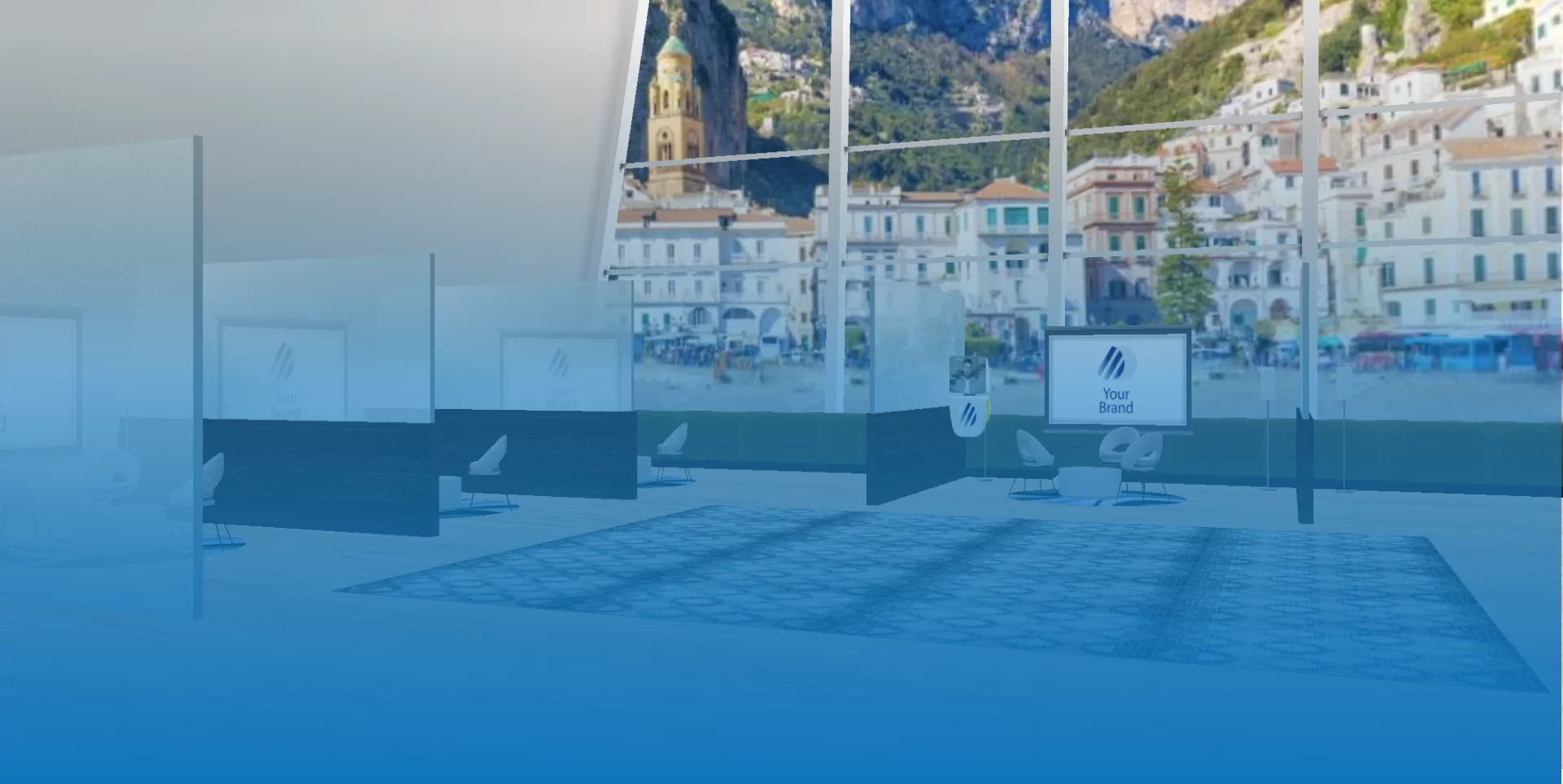The metaverse may not be as ubiquitous as it was during the height of the pandemic, but it still offers unique event opportunities to engage audiences and internal teams. Here’s how to easily plan an effective and impactful event in the metaverse.
The concept of the metaverse exploded during the pandemic when virtual events were at their peak, and millions of people were joining interactive experiences like Travis Scott’s Fortnite performance.
If utilized wisely, the metaverse has proven to be a captivating and unforgettable realm for various events, such as concerts, product launches, and conferences. Discovering how to host a virtual event in the metaverse can unlock its full potential.
The metaverse is a somewhat nebulous term that has not yet been precisely defined, but in general, metaverse platforms create 3D environments that can elevate events into immersive virtual experiences, whether they are VR-enabled or web-based.
The following guide includes metaverse event production tips to help you go beyond basic live-streaming and make the most of what the virtual world has to offer.
Metaverse events differ from regular virtual events and here’s why:
Overall, metaverse events deliver a captivating experience, combining immersion, personalization, social interaction, and global connectivity.
Let’s dive deeper into the specific steps required to host a metaverse event.
Metaverse event is an online event requiring virtual event planning best practices. Namely, your first action items should be to consider the purpose of your event and determine your goals and KPIs.
Instead of getting bogged down by different platform features and offerings, let your purpose and goals guide you as you evaluate potential technology partners and make your way through the rest of the planning process.
Before you decide on a metaverse event platform, you need to first determine if the metaverse is the right venue for your event.
For example, the metaverse is a particularly good option for networking events as it enables attendees to move around and interact in a way that is similar to the way we move around in real life. If you’re looking to attract remote attendees for a product launch, a metaverse experience will allow them to view the product in a 3D space and participate in activities such as virtual try-ons, etc.
In addition, having a clear idea of your objectives and any important metrics to track will help you effectively assess the event’s success based on analytics and data after the fact.
Virtual event technology has come a long way in the past few years, and metaverse platforms are no exception. There are now several 3D virtual event spaces to choose from, including Decentraland, Somnium Space, and Meetaverse, just to name a few.
As with any physical venue, each platform has its advantages and downsides, so the ideal partner for your event will depend on your event goals and needs.
For example, some platforms, like Decentraland, are open-world spaces that may be better suited to a product launch or consumer-facing event, while Meetaverse may be a good fit for metaverse business meetings and corporate events due to its sales and marketing focus. On the Meetaverse platform there is an ability to track engagement, and capture user data for deep virtual events analytics.
Metaverse events combine the advantages of immersive brand experiences, limitless creativity, and global accessibility. For example, the Meetaverse platform provides attendees with a unique and engaging environment where they can interact with 3D spaces, personalize their avatars, and forge meaningful connections.
Additionally, metaverse events offer unparalleled branding and sponsorship opportunities, allowing companies to showcase their offerings in innovative ways and reach a global audience.
If you’re organizing a virtual conference, don’t hesitate and opt for a metaverse conference platform. Choosing a metaverse platform will not only save you time and money but also enable you to conduct a comprehensive post-analysis of the virtual conference.
With these advantages, virtual events on the Meetaverse platform have the potential to revolutionize how gatherings are hosted and experienced.
Once you’ve decided on a technology partner, you can move forward with planning virtual event design based on the capabilities of the platform. Some are more customizable than others. For example, you may be able to incorporate an expo hall, an auditorium, a lobby area, meeting rooms, etc., based on your event type and add your event branding throughout the space.
The advantage of Metaverse platforms is that they generally allow you to be creative and include design elements that you may not have been able to include in real life.
For example, you may be able to include interactive videos throughout the space that guests can view as they move around, or design a fully-branded networking and dance party on a rooftop without worrying about budget constraints.
In the metaverse, there are numerous opportunities to implement captivating ideas.
Now, let’s envision a scenario where your company organizes monthly “Ask Me Anything” meetings with department heads. As the HR manager, it’s your responsibility to create a comfortable atmosphere for the teams.
If your corporate culture leans towards tradition, your virtual space could resemble an offline setting: a spacious room with chairs and a screen for presentations or showcasing future plans.

However, if your company embraces innovation and exploration, your monthly team meetings could take place in creatively themed environments, perhaps even in Jurassic Park! Your imagination is the only limit when it comes to choosing where to host your upcoming team gathering.

Be sure to consider the size of the space you’ll need and plan the layout based on how attendees (in metaverse avatar form) will navigate the area and interact with each other. Working with an experienced partner is particularly helpful if you’re new to building in the metaverse.
Want to create a virtual event?
Leave your contact information and a Meetaverse professional will be happy to tell you more about how we can help
As you’re creating the schedule for your event, keep in mind that while much of the process is the same for online and in-person events, metaverse virtual events offer more flexibility. For example, you can use a mix of live and pre-recorded content to take some pressure off on the day and to ensure you have backup content if anything goes wrong.
When scheduling virtual event sessions, it’s a good idea to keep them on the shorter side to accommodate virtual attendees’ shorter attention spans, but be sure to keep the length realistic. It’s arguably even more important to stick to the schedule when the event is virtual, as certain attendees may log on for a specific session and will be frustrated if the timing is off.
Here are some tips to enhance your virtual event and make it more effective:
When your event details are locked, invite attendees and promote your event using the channels you would use for any event, such as email marketing and social media. Beyond the basic event information, you’d typically include in the invitation, if you’re hosting your event in the metaverse, you’ll also need to provide an onboarding guide.
The guide should include clear instructions on how to access the platform and any technical tips for attendees to keep in mind, such as compatible devices, minimum internet speeds, and recommended browsers. If they need to download an app or other software, they should be encouraged to do so ahead of time.
When hosting an event in the metaverse, it’s essential to test it out with speakers and other internal stakeholders in advance, to ensure that the backend is functioning properly, connections are stable, and speakers and moderators know how to use the platform and perform their functions.
Here are several steps you can take to minimize the risk of technical issues disrupting your event:
By implementing these measures, you can proactively manage potential tech issues and ensure a more seamless and successful virtual event experience for both speakers and attendees.
In the worst-case scenario of the platform going down, make sure you have a plan for how you’re going to communicate with attendees, whether it be by email or social media, to update them and let them know when the problem is fixed.
Working with a technology partner that can manage the backend and troubleshoot any issues that arise is recommended for added peace of mind.
On the day of the event, make sure you have enough support – whether on your own team or via your technology partner – to be able to address any technical issues that arise. Platforms that offer live day-of support can take this off your plate and help ensure a great experience for attendees. Some metaverse platforms even have playbooks on how to host an event in the metaverse.
Monitor platform analytics and attendee activity to make sure everything is running smoothly. Depending on the platform, you may be able to change things up on the fly if you see that engagement is down or attendees are not connecting with certain sessions and activities.
Your post-event strategy for a metaverse event should be the same as for an in-person event. Thank attendees for joining, request that they complete a survey to offer their feedback, and share some event highlights.
If you plan to host post-event content for them to consume on demand, which is strongly recommended, include a link and instructions on how they can access it. If you plan to leave the space open for ongoing networking, follow up with instructions on how best to use the platform for that function.
A silver lining of the pandemic has been the proliferation of virtual events in the metaverse and coworking tools that have enabled people from around the world to connect, learn, and work in ways they weren’t able to before.
Hosting your event in the metaverse provides your attendees with a unique and immersive experience from their home or office, and Meetaverse makes it easy to plan and execute. Contact us today to schedule a demo and see how we can help bring your event vision to the Metaverse.
Want to create a virtual event?
Leave your contact information and a Meetaverse professional will be happy to tell you more about how we can help
Although some platforms may be more robust or offer more features than others, the best metaverse platform will ultimately depend on your event, needs, and budget. There are many options out there, from more basic meeting spaces to a full open world. The best way to find the ideal solution for your event is to conduct a virtual event platform comparison, always keeping your objectives top of mind.
The ability to pre-record content is one of the benefits of hosting virtual events. Having some content ready to go can help streamline sessions on the day of the event and limit the risk of speakers having technical issues.
You may choose to make some pre-recorded content available on demand for attendees to view and go back to at their leisure, or you can stream it as a simu-live session that starts at the same time for everyone and looks just like a live session. With simu-live sessions, having the speaker available to answer questions and comments live can be a great way to increase attendee engagement.
Here are some key points about utilizing pre-recorded content in virtual events:
1. Streamline sessions
2. On-demand availability
3. Simu-live sessions
4. Live engagement
By leveraging pre-recorded content in virtual events, you can optimize session management, provide flexibility to attendees, and enhance engagement through simu-live sessions and live interaction opportunities.
Absolutely. Many Metaverse platforms can be used to host hybrid events, although possible setups will depend on the platform’s capabilities. For example, you may be able to recreate a 3D virtual version of the physical venue for remote attendees to explore and view live streamed sessions from. If the metaverse platform is available on mobile devices, the in-person audience would also be able to check out the virtual world and potentially interact with virtual attendees.
Like any other online activity, virtual events are susceptible to data and security breaches, so as an event planner, it’s important to take steps to safeguard your attendees’ information. Here are a few quick tips for a secure event:
– Make sure never to share a public link to the event; only send access info to registered attendees.
– Encrypt all data and documents that you store.
– Have a plan in place for dealing with and potentially removing attendees who are behaving inappropriately.
Since there’s only so much in the planner’s control, it’s also key to make sure you’re working with an event technology company with strong safety protocols and standards. Ask about this during the platform sourcing stage to make sure you’re comfortable with the platform’s privacy and security features.
The virtual event in the metaverse follows a specific set of steps to create an engaging and immersive experience for participants. Here’s a breakdown of how the virtual event works:
1. Platform Selection
2. Registration and Access process
3. Avatar Creation
4. Virtual Venue Exploration
5. Interactive Presentations
6. Networking and Collaboration
7. Engagement and Interaction
8. Post-event Analytics
By following these steps, the virtual event in the metaverse enables participants to create avatars, explore virtual venues, attend interactive presentations, network with others, visit virtual exhibitions, engage in collaboration, and contribute to a dynamic and immersive event experience.
As organizations move from physical offices to hybrid and digital-first environm...
read moreVirtual business meetings have become an indispensable tool for communication an...
read moreThe way conferences are conducted has undergone significant changes, and now the...
read more

